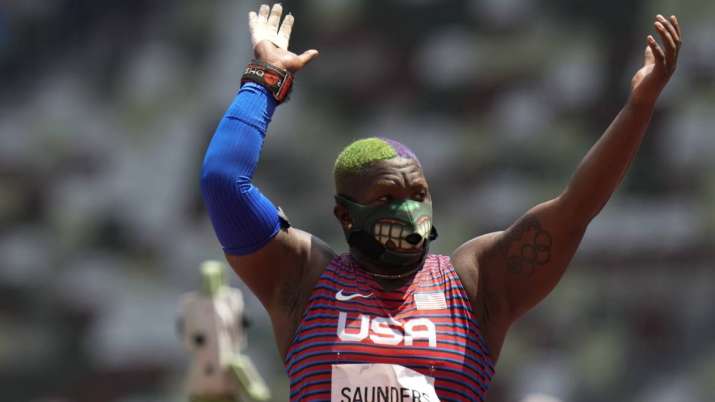
File photo of Raven Saunders.
The “Incredible Hulk” mask shouldn’t fool anyone. Raven Saunders has nothing to hide.
The face and voice of the Tokyo Olympics, and whatever it is about them, can very well be found in the 25-year-old American shot putter, who can be seen wearing green and red superhero face coverings on Sunday. , sporting purple and green hair, wearing neon-blue shades and winning a dazzling silver medal.
Saunders is openly gay, has contemplated suicide, has seen poverty and depression devastate his black community and others. She often wonders whether the Olympics, which is a great point of celebrating diversity but often struggles to fulfill that mission, has room for someone like her.
He has decided to claim his place by any means necessary. And in a space where Simone Biles, Naomi Osaka and other well-known Olympians are speaking their truth, Saunders is ready to share.
“I should be. Not apologizing for that,” she said in a wide-ranging conversation after finishing second, when asked what her final mission was.
“To show young people that no matter how much you try to fit into the box, you can be you and you can accept it. People tried to tell me not to do tattoos and piercings and all that Should. But look at me now, and I’m poppin’.”
The Hulk mask that Saunders started wearing not so long ago has its roots in many things. Namely, it’s a reminder that a woman whose bench pressed 480 pounds and squatted 700 pounds and won four NCAA titles is bound to look tough on the outside, but can be very different on the inside.
Even though she had already gone to the Olympics in Rio de Janeiro, and was in the middle of an upward career, Saunders said in an Instagram post that on January 26, 2018, she was on her way to “carry” . outside) attempt to end my life.”
“I wouldn’t be here (right now) if it weren’t for an old doctor to send a text to,” she said.
“All these things haunted me for 22 years before I was finally able to process it. I was finally able to separate Raven from the Hulk.'”
According to the website OutSports, Saunders is one of nearly 180 LGBTQ athletes competing at the Tokyo Olympics, which is estimated to be more than three times the number of those competing in Brazil five years ago.
She recently told the website that she came to her mother in third grade. She was out to classmates in sixth grade, and in ninth grade, she finally started getting comfortable with who she was. By the time she got to college, Saunders was out.
It was never an easy road.
“I think the atmosphere around a lot of things, especially when you’re doing so well, well, you have everything going for you, so you have nothing to worry about,” Saunders said. . “Whereas for me, it was like a tornado.”
She used her platform on Sunday to talk about mental health, especially in the black community, where she saw depression and other symptoms go untreated and go unreported for years. “Mad houses,” she said, calling some homes in the black community where symptoms were seen but not tested.
She said that these days, some of her friends and classmates see therapists where they might not have done so a few years ago.
“People are in need, and I think in our community, at times through history, we don’t have access to the resources to be able to do that,” she said.
Among those Saunders most recently is Gwen Berry, the vocal hammer thrower with whom she crossed paths during her time at the University of Mississippi.
“Raven has been through hell and back,” Berry said after reaching the finals in his competition.
“I am very happy to see her thrive and win. Let me tell you a little secret, about two months ago she called me crying. She has gone through a lot. So I am happy for her.”
All these conflicts are not as fierce today as they were five, or three, or a year ago. Mental health has been a major theme of the Olympics, and with her spot on the podium, Saunders is ready to stake her claim to the heart of this conversation.
The more she is out there, the more she is getting to know that she is not alone.
“I really think my generation doesn’t really care,” Saunders said.
“Shout out to all my black people, shout out to all my LBGTQ community, shout out to all those dealing with mental health. Because at the end of the day, we understand that this is bigger than us, and it’s bigger than the powers that be in us.” are near.”
.